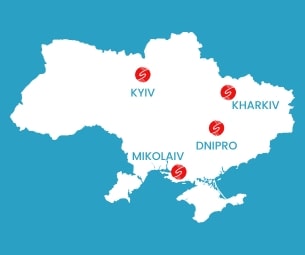On February 24, 2022, the Russian Federation launched a violent attack against Ukraine from Belarus, the north and east of its territory and the territories it had occupied since 2014 in Ukraine. What the authorities of the Russian Federation called a “special operation” quickly turned into a long-lasting all-out war, destroying the combat zones from Kharkiv to Mykolayev, through Mariupol. Throughout the territory, air strikes have devastated infrastructure vital to the country and its people.
From the first days of the conflict, SOLIDARITÉS INTERNATIONAL has been committed to bringing vital aid to the affected populations just a few days after the attack started. Feedback on the commitment of our teams during the first year of a devastating conflict.
Human and material toll
The damage is considerable. First of all, in human terms: nearly 18,000 civilians have already been killed or wounded[1]. Millions of others have been forced to leave their homes to seek shelter.
“Every day and night, there were airstrikes on Kherson. The windows of our balcony were broken by debris. Our daughter’s apartment, which was nearby, was also damaged. She went to Spain to seek refuge and I went to Odessa. It was too frightening to live under these conditions. My nervous system couldn’t take it anymore,” said Lyubov, 72, a resident of Kherson, who moved to Odesa.
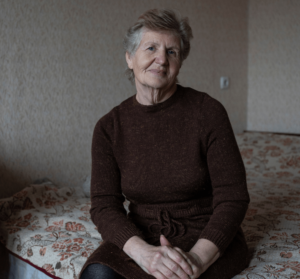
Ukraine
Context and action- 37 million inhabitants
- 77th out of 191 countries on the Human Development Index
- 501,843 people rescued since march 2022
At the end of 2022, the International Organization for Migration counted 5,914,000 displaced persons, including 1 million children, and nearly 8 million Ukrainians living as refugees outside their country.
The damage to civilian infrastructure is severe. In the combat zones, many homes and buildings have been destroyed or damaged and are uninhabitable, hospitals are overcrowded, if not closed or demolished, and water and gas networks are no longer functioning. Throughout the country, electricity and heating infrastructures are regularly targeted by missile strikes, with serious consequences for the population in the middle of winter.
“Before we left Kherson, we had no water or electricity for several weeks,” says Lyubov. “My husband still lives there. It is 8 degrees in our apartment because there is no heating.”
Accessing health care, drinking clean water, and protection from cold and disease is therefore complicated, especially near the front line. The same is true for other basic needs: while the economic system and the functioning of markets have been severely damaged, food, medicine and hygiene products have become problematic for many Ukrainians.
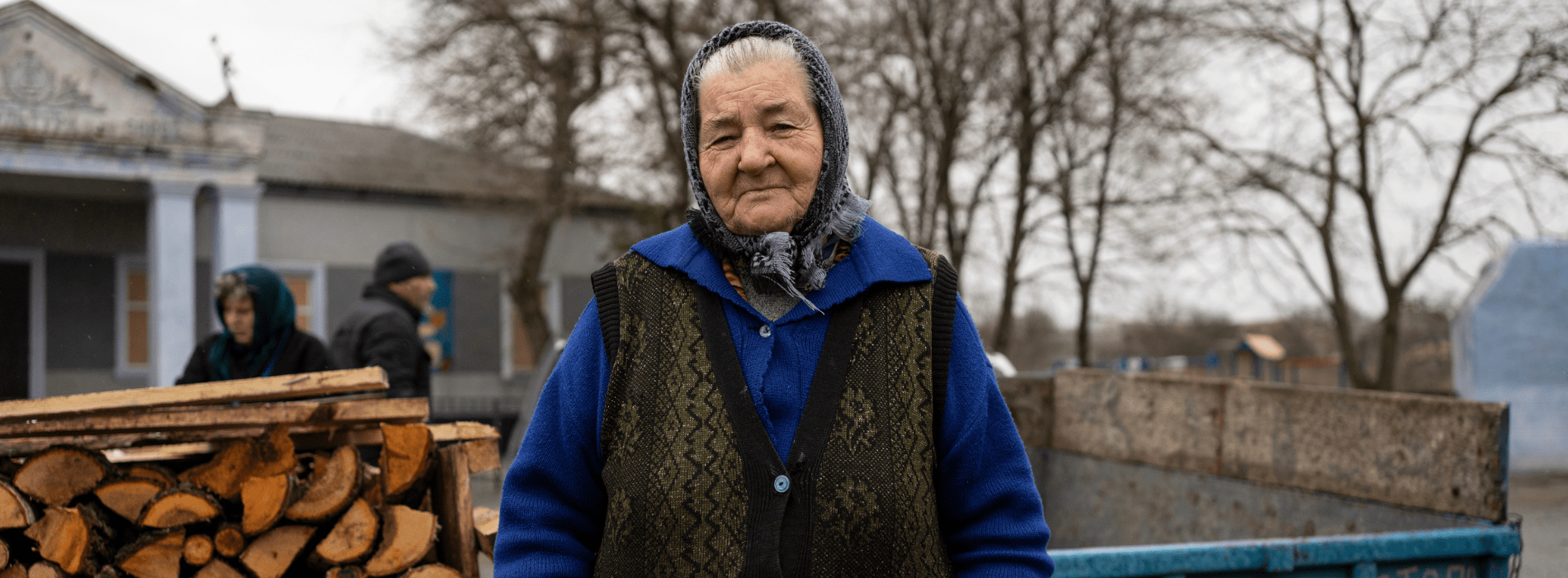
In addition to these difficulties, the displaced persons have housing problems. Many of them have no choice but to crowd into collective housing in very precarious conditions.
All-terrain operations in Ukraine
Since the beginning of the conflict, SOLIDARITÉS INTERNATIONAL teams have been mobilized, first of all, in the areas directly affected by the fighting: the Oblasts of Kharkiv, Dnipro, Donetsk, Mykolaïev and Kherson. The objectives are multiple: to provide the populations with food, drinking water (via the of water by truck, the distribution of transport bottles and the rehabilitation of damaged hydraulic networks) and heating.
From the very first days of the war, Our NGO has also been providing support to people fleeing the fighting and in transit to the west of the country or abroad, by supplying them with hot meals, drinking water and travel kits (dry food, hygiene products in particular). Support is also provided to the collective centers and town halls that welcome them.
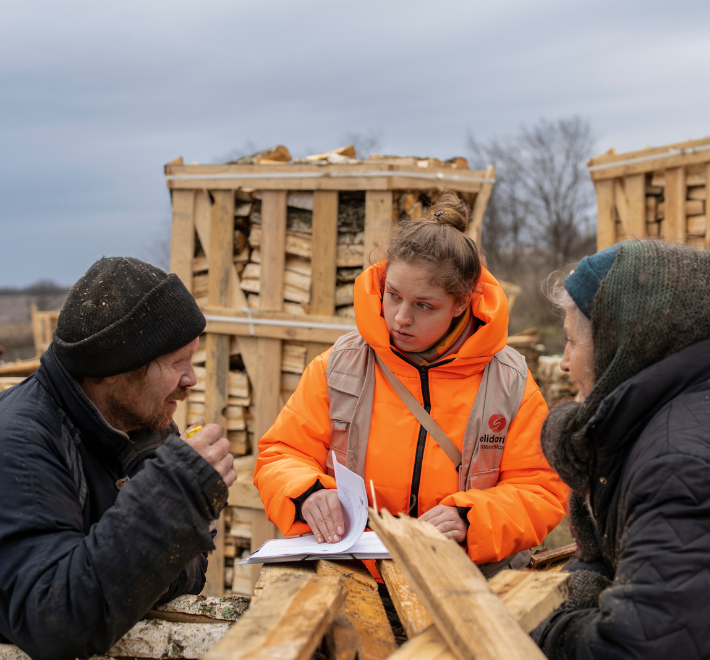
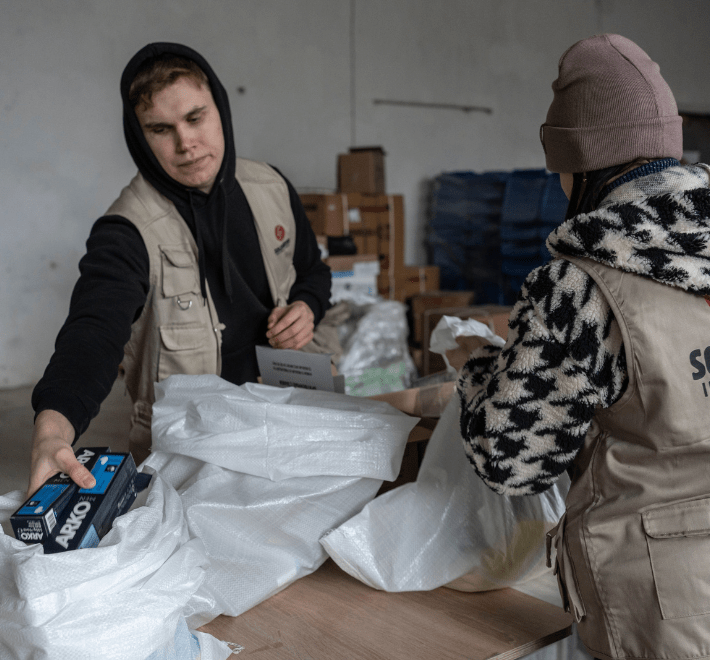
In the west of the country (Lviv and Uman) and in the major cities (Dnipro, Odessa, Kharkiv, and other secondary cities), the third axis of intervention targets the displaced persons who have settled there. “We are committed to providing them with the means to meet their needs, but also to rehabilitating the homes and centers in which they have taken shelter in order to ensure them more decent conditions of survival,” explains Yann Julou, head of programs at our NGO’s Emergencies desk.
Many of these activities are carried out in collaboration with local partners. Indeed, while SOLIDARITÉS INTERNATIONAL implements activities independently as close as possible to the front lines, it also supports actions carried out by local NGOs and very active volunteer networks. “This system of cooperation enables us to reach a wider population,” says Philippe Bonnet, head of the Emergencies desk.
Multi-sectoral assistance in Moldova
Assistance is also needed outside Ukraine’s borders. SOLIDARITÉS INTERNATIONAL is rapidly responding in Moldova where many Ukrainians are seeking refuge. In particular, the NGO is serving hot meals in reception centers and ensuring that as many refugees as possible have access to drinking water, toilets and washing facilities.
There are still 90,000 refugees in the country today.
“Part of this refugee population will continue to live there for some time. We have therefore decided to work to strengthen social cohesion between the vulnerable Moldovan population and the refugees who will stay for the long term,” says Yann Julou.
In concrete terms, this means supporting local structures that offer these refugees better access to the Moldovan health system, education system, early childhood services and professional training.
The conflict is not over, and it is difficult today to establish a scenario of the situation in 2023 or even 2024. Our teams will continue to work with vulnerable populations, wherever they are, as close as possible to their needs. While current activities will continue as described above, some areas of the country which are devastated by the fighting are now accessible due to the retreat on the front line. This could be the case for other areas in the coming months. Needs are immense, as these areas have seen massive destruction. “We need to help the inhabitants to stay there and support their return by ensuring that they can benefit from basic public services and have access to essential goods that will enable them to live in dignified conditions.” Concludes Philippe Bonnet.
© Myriam Renaud
[1] Office for the Coordination of Humanitarian Affairs, January 2023

